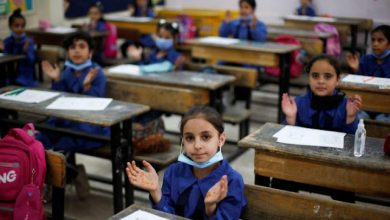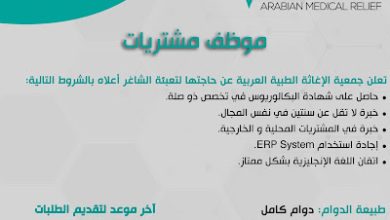Programme & Policy Officer – CBT Operations and Beneficiary Identity Management (CST II)

.
WFP celebrates and embraces diversity. It is committed to the principle of equal employment opportunity for all its employees and encourages qualified candidates to apply irrespective of race, colour, national origin, ethnic or social background, genetic information, gender, gender identity and/or expression, sexual orientation, religion or belief, HIV status or disability.
ABOUT WFP
The United Nations World Food Programme is the world's largest humanitarian agency fighting hunger worldwide. The mission of WFP is to help the world achieve Zero Hunger in our lifetimes. Every day, WFP works worldwide to ensure that no child goes to bed hungry and that the poorest and most vulnerable, particularly women and children, can access the nutritious food they need.
TERMS AND CONSITIONS:
|
TYPE OF CONTRACT: |
CST -II |
|
UNIT/DIVISION: |
Programmes |
|
DUTY STATION (City, Country): |
Port au Prince |
|
DURATION: |
11 months |
ORGANIZATIONAL CONTEXT
The United Nations World Food Programme (WFP) is the frontline UN agency in the fight against hunger. Since its creation in 1963, WFP staff around the world have worked tirelessly to eradicate hunger. Each year, WFP feeds more than 90 million people in over 70 countries. Recently, WFP has been diversifying its portfolio along the humanitarian and development spectrum with preparedness and immediate response emergency operations; recovery and resilience activities, including the implementation of capacity strengthening for social safety nets, school meals, nutrition- sensitive activities as well as progressive local purchases; and the provision of emergency logistics, telecommunications and aviation services. Haiti’s Human Development Index (HDI) ranks 170 out of 189 countries in 2020. Rates of extreme poverty are high and their cause is multidimensional. This poverty is manifested in particular by high illiteracy rates, a life expectancy of 63.7 years in 2018, high infant mortality and significant gender inequalities. A large majority of the population does not have access to basic services such as drinking water, electricity, sanitation and health coverage.
In addition, Haiti is vulnerable to natural disasters. It is considered the fifth most exposed country to natural disasters. The country has suffered, in less than ten years, more than four major disasters from which the country is still struggling to recover: the earthquake of 2010, tropical storm Isaac and hurricane Sandy in 2012, hurricane Matthew in 2016, hurricane Irma and Maria in 2017 and the earthquake of 2021. The country is therefore exposed to earthquakes, the passage of cyclones and also to drought waves linked to the El Nino phenomenon (2018). Beyond these factors, food insecurity is driven by the poor performance of the agricultural sector combined with the strong dependence on imports of food products (more than half of the food products present on the market) in particular for rice (83%). Product prices are largely influenced by logistical challenges, high production costs, precarious market structures and high inflation rates in recent years.
According to the latest IPC analysis (September 2022 – February 2023) published in October 2022, approximately one in two households in Haiti is acutely food insecure, with more than 1.7 million people in the emergency phase (IPC4). This is an increase of about 500,000 people in IPC4 compared to the previous analysis. Similarly, 19,000 people are in IPC Phase 5 (Disaster), which is a first for Haiti, and for the Americas since the IPC began. These worrying results are largely linked to [1] the political crisis that has taken hold in the country since July 2018 which has led it into an economic and social crisis, [2] to an agro-climatic crisis with significant pockets of drought in the country causing a significant decrease in agricultural production. In addition, the COVID-19 pandemic has contributed to the increase in food insecurity. The growing insecurity and the blocking of certain access points to the country, in particular since June 2021 the road leading to the Great South, have worsened the indicators of food insecurity. In Autumn 2022 the Country further endured 2 months of heavy socio-economic turmoil and blockade of most imported goods, but especially fuel, leading to a de-facto paralysis of the entire Country with continued and protracted consequences on inflation, fuel and food availability until today.
JOB PURPOSE
The World Food Programme in Haiti has defined its strategy to fight hunger in the Country Strategic Plan (CSP 2019-2023), which includes activities related to emergency food assistance to populations affected by a shock, the establishment of social nets oriented towards nutrition, capacity building and livelihoods of small producers and their resilience to climate change, and capacity building of national and local actors for the fight against hunger. A new CSP exercise has been taking place to determine the 2024-2028 plan and since the Autumn events, WFP Haiti CO has declared L3 corporative scale-up and keeps growing its targets and operations.
For the time being, the WFP Haiti office uses the SCOPE corporate platform for beneficiary data management and cash transfer processes (registration, allocation of funds, reconciliation). Although the current focus is on cash transfers, SCOPE is designed and developed to support all of WFP's transfer modalities: in-kind, vouchers and cash for various project activities. As an extension of SCOPE and over the next few years, WFP also plans to develop a wide range of digital assistance services beyond those related to the current SCOPE capabilities. The WFP Haiti country office intends to participate in this effort to diversify digital solutions beyond SCOPE to support humanitarian and social protection programming and, where appropriate, partners and governments.
Regarding cash transfer mechanisms, the WFP office in Haiti carries out most of its CBT interventions (conditional and unconditional assistance) through cash in envelopes on site, but also has other mechanisms such as cash at the counter, E-money and in the past also paper voucher (value vouchers). These cash transfers are carried out through four financial partners (the country office is seeking diversity of solutions looking for additional FSPs’, especially for E-money). WFP's objective is to increase the volume of cash transfers in E-money, particularly for the new social safety nets set up by the Government of Haiti with WFP support.
Thus, the multiplication of emergency, resilience and new social safety net operations leads to an additional need for human resources, particularly to perfect and diversify CBT mechanisms and to support with digitizing cash transfers. WFP requires a CBT Operations and Beneficiary Identity Management Officer in Port-au-Prince to support WFP's operations in Haiti in all intervention mechanisms, including conditional and unconditional assistance.
KEY ACCOUNTABILITIES (not all-inclusive)
1.Ensure the good management of the CBT Operations team, including beneficiary data management, in line with the CO’s organigramme and operational needs. Recruit and train adequate staff to accommodate the operational scale up as per the CO’s staffing plan. Co-supervise and advise the CBT multifunctional group and CBT focal points with staff from various units, namely Programme, SC, Finance and TEC. 2. Elaborate and ensure that Cash Based Transfer procedures are in place and implemented in the Haiti Country Office in accordance with the CBT Assurance Framework to ensure that activities are carried out correctly and that the right assistance is delivered to the right person under the right conditions. 3. Have an overview of the planning of CBT interventions in collaboration with the different Activity Managers and make relevant analysis on WFP's capacity in Haiti to implement them. The plans should also be shared with management, particularly in the framework of the internal CBT Working Group. 4. Establish a training plan for cooperating partners and Financial Services Providers (FSP) on operational aspects related to CBT set up and beneficiary payments with emphasis on compliance with WFP procedures, security aspects, humanitarian values of the interventions and protection of beneficiaries. 5. Coordinate and lead the implementation planning efforts with the different Financial Service providers. 6. Provide periodic reports on CBT activities conducted with accurate information that will facilitate general reporting and external communication activities. 7.Supervise the reconciliation process including the invoicing of FSPs in compliance with WFP standard procedures and establish tools which allow an easy monitoring and alerts, and supervise the preparation of the monthly reconciliation reports for each FSP. 8. Support the management of partnerships with WFP's FSPs in Haiti participating to the tender process and contracting of FSPs and ensure their solid performance and compliance with payments, activities, and invoicing process. 9. Support the Head of CBT in the preparation of the internal Cash Working Group sessions by proposing agenda items, preparing presentations and providing relevant information for the working group's decision-making.
DELIVERABLES AT THE END OF CONTRACT:
1/ Monthly planning of cash transfer activities is conducted and shared within the programme unit and more extensively with other units involved in cash transfers like Finances, TEC, Security, M&E. Operational reports are also produced and shared internally.
2/ Procedures for compliance with the CBT Assurance Framework are put in place and SOPs are developed, updated, validated and implemented in the WFP Haiti office.
3/ Regular meetings with implementing partners and financial service providers are maintained to address the various challenges related to cash transfers operations and to build the capacity of these partners.
4/ Internal cash working group sessions present basic information related to cash transfers to allow for decision making on safe and compliant CBT interventions in the country.
5/ Ensure – with the reconciliation committee – a timely and transparent reconciliation of all CBT interventions with all service providers and produce monthly reconciliation reports.
6/ Staff working on Identity Management and CBT operations at the operational level are familiar with corporate procedures and apply them in compliance with corporate minimum requirements.
QUALIFICATIONS & EXPERIENCE REQUIRED:
Education: University degree at the master's level in international cooperation, political science, social science or another field related to humanitarian assistance and development or first level university degree (Bachelor's degree) with additional years of experience in the field of humanitarian assistance and development.
Experience: At least five (5) years of professional experience in the management or implementation of humanitarian or development projects related to food assistance and nutrition. Advanced professional experience in the implementation of cash transfer operations. Experience in inter-institutional coordination with different humanitarian actors (international organizations, NGOs…), government institutions, civil society organizations.
Knowledge & Skills: Knowledge of cash transfer programs with several transfer mechanisms. Experience in digitalization of CBT operations. Strong motivation to carry out the required responsibilities. Ability to work in a team with national and international staff (multicultural environment).
Languages: Fluency (level C) in both oral and written communication in French. Working knowledge of English
WFP LEADERSHIP FRAMEWORK: COMMON STANDARDS OF BEHAVIOUR:
|
Leads by Example with Integrity |
Drives Results and Delivers on Commitments |
Fosters Inclusive and Collaborative Teamwork |
Applies Strategic Thinking |
Builds and Maintains Sustainable Partnerships |
|
Upholds WFP values, principles, and standards |
Delivers results for maximum impact |
Is inclusive and collaborative, and contributes to a culture of learning and personal growth |
Demonstrates curiosity, designs and implements new ways of doing things when relevant |
Initiates and builds partnerships by identifying and promoting opportunities for mutual areas of interest and benefit. |
DEADLINE FOR APPLICATIONS
Closing Date: 19 April 2023
.
WFP has a zero-tolerance approach to conduct such as fraud, sexual exploitation and abuse, sexual harassment, abuse of authority and discrimination. All selected candidates will be expected to adhere to WFP’s standards of conduct and will therefore undergo rigorous background verification internally or through third parties. Selected candidates will also be required to provide additional information as part of the verification exercise. Misrepresentation of information provided during the recruitment process may lead to disqualification or termination of employment
WFP will not request payment at any stage of the recruitment process including at the offer stage. Any requests for payment should be refused and reported to local law enforcement authorities for appropriate action.





